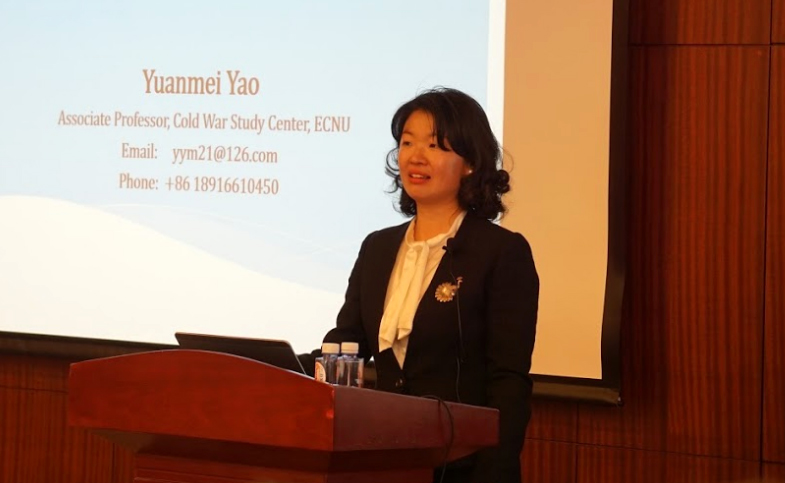The NYUSH-ECNU Joint Center on Global History, Economy and Culture hosted earlier in February, a well-attended meeting featuring Prof. Yao Yuanmei from ECNU’s Cold War Study Center, on the legacies of Great Britain’s nineteenth century effort to establish a “scientific frontier” for a “safer and “more defendable” colonial empire on the Indian subcontinent. NYU Shanghai Prof Chen Jian, co-director of the joint center, offered his own comments before opening the discussion to over 100 faculty and students from NYUSH, ECNU, Fudan University, and Shanghai Normal University among others.
Relying on original research at British and other archives around the world, Yao presented rarely seen documentation showing how the so-called “scientific frontier”, drawn up without any apparent concern for local realities, served Great Britain’s effort to dominate the region and fend off Russian expansionism in Central Asia. But, the scheme, according to the ECNU professor, also sowed the seeds of tension in the Hindu Kush and Himalayas regions that has led eventually to Indian-Chinese border disputes, and, in 1962, to war between the two countries.
Yao argued, among other things, that by creating “black holes” along the border where resistance group could operate, the British scheme unsettled the vast border region, making it one of the most unstable frontiers in the world. According to Yao, the legacies of the British effort haunt us to this day, having trapped the Soviet Union in the 1980s and, for the past fifteen years, the United States in “un-winnable wars” in Afghanistan. Yao concluded that we are “still living in the dark shadow of the 19th-century products of British imperialism, and that without casting away these legacies, it is impossible for the border issues to reach a fair and lasting settlement.”

Following the featured presentation, Prof. Chen Jian noted that Yao’s research “reinforces the mainstream interpretation,” shaped by Neville Maxwell, Allen Whiting, John Garver, and Roderick MacFarquhar among others, of the origins of the 1962 Chinese-Indian border war. Quoting Henry Kissinger, he said that the issue “arose over the interpretation of colonial history,” adding that it was New Delhi’s “forward policy,” rather than Beijing’s “expansionist intention,” that triggered the war.
Turning to the contemporary implications of the British legacy, Chen pointed out that China, today, is not a “revisionist country”, arguing that “from the ‘Wilsonian moment’, to the Atlantic Charter and the establishment of the United Nations, China has consistently championed anti-imperialism and anti-colonialism, key principles underpinning the “liberal world order.”
In the past four decades, Chen went on to explain, China embarked upon the “reform and opening up” process, and, along the way, transformed itself into an “insider” of today’s world order. Yet, he emphasized, China now faces profound challenges, the biggest ones of which are those from within rather than from elsewhere.
How can such challenges be met? Professor Chen suggested that great ideas can only emerge in an environment of political and cultural pluralism, concluding with a quote from Mao Zedong, “Allow others to speak out, the sky will not fall down and you yourself will not collapse; shut up others’ voice, the sky will still not fall down, but, sooner or later, you yourself will collapse.”


